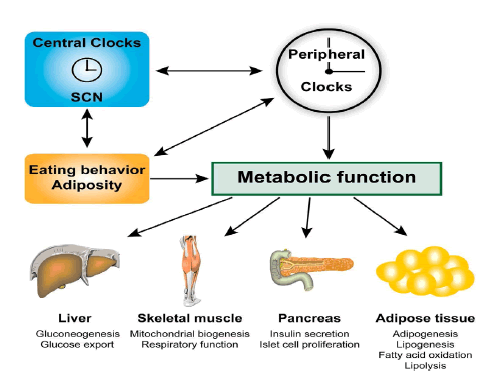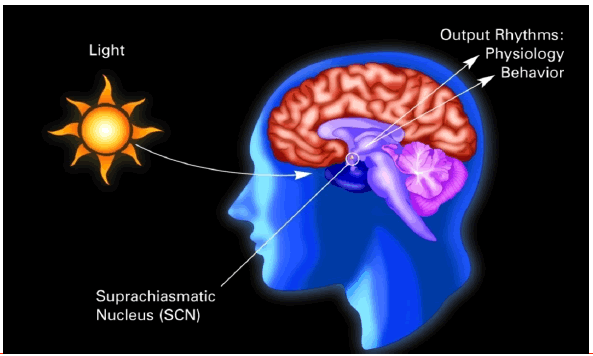Disruption of Environmental and Lifestyle Factor Disturbs Circadian Rhythm: Predisposition to Metabolic Diseases
- Corresponding Author:
- Jagriti Agarwal
Amity Institute of Physiology and Allied Sciences, Amity University, Noida, India
E-mail: agarwaljagriti24@gmail.com
Received: 21-May-2022, Manuscript No. ijocs-22-64489; Editor assigned: 23-May-2022, PreQC No. ijocs-22-64489(PQ); Reviewed: 11-June-2022, QC No. ijocs-22-64489(Q); Revised: 25-June-2022, Manuscript No. ijocs-22-64489(R); Published: 29-June-2022, DOI: 10.37532/1753-0431.2022.16(6).245
Abstract
Introduction
A biological process called circadian rhythm synchronises the sleep-wake cycle and happens repeatedly every 24 hours. Any natural process that exhibits intrinsic regulation over a period of around 24 hours is referred to as such. The word “circadian” comes from the latin language and means “all daily.”
Role of Circadian Rhythm to Metabolism
The 24-hour daily cycle’s circadian rhythm is crucial for controlling metabolism [1]. Circadian rhythm enables behaviour in an organism to anticipate and modify itself to periodic changes in its habitat. It is seen that different facet of physiology and behaviour were synchronized which would affect locomotor action, sleep/ wake cycle, hormonal rhythm, metabolism and cognitive performance. Disrupted rhythms can also result into varied persistent health issues, like sleeping disorders, corpulence, diabetes, stress, and other disorders. Literature provides strong evidence for important role of sleep/wake cycle in the functioning of endocrine system, pituitary hormones and pituitary-dependent hormones [2].
A reduction in the quantity and quality of sleep has a negative impact on glucose metabolism, as well as sedating the hormone leptin, stimulating the hormone ghrelin, and boosting appetite and hunger. Numerous epidemiologic studies have demonstrated a link between inadequate or short-duration sleep and the development of diabetes mellitus or obesity (Figure 1) [2].
Figure 1: Modulation of food intake resulting into metabolic dysfunction by circadian clock [3].
Mechanism
The arrangement of circadian structure in human body is distinctive. It contains of two fragments:
- In hypothalamus a central clock is discovered in the region of Suprachiasmatic Nucleus (SCN) (Figure 2).
- It is discovered that a sequence of peripheral clocks is present in further tissues of the body, counting the liver, pancreas, gastrointestinal tract, skeletal muscle, and adipose tissues [1].
Figure 2: Light enters in mind through eyes and passes to Suprachiasmatic Nucleus (SCN) in central clock which responds physiologically as well as in behaviour [4].
According to notion, direction of metabolism in central clock is carried out by effusive components (chiefly cortisol and melatonin) and synaptic protrusions. On the other hand, cues of the clock is merged with factors associated with surrounding. (counting light exposure, sleeping pattern, physical activities, and food intake) [1].
- Till date, it has been presented that sunlight has the power to regulate autonomic and neuroendocrine reactions. Sunlight can also modulate the sleep performance. It has been seen that, when sunlight is perceived by retina of eye, electric signals generate, which go via retinal hypothalamic tract to the SCN. In SCN, these electric signals transform into chemical messengers, which pass via neurons present in core of SCN, to the pineal gland and stimulate it. On getting stimulated, pineal gland inhibits the release of its hormone, i.e. Melatonin, which is a sleep hormone, thereby keeping humans awake during daytime. At night, since no sunlight enters eye, therefore pineal gland causes rise in secretion of melatonin, causing sleep sensations. Therefore, through this general mechanism, it can be concluded that, inadequate amount of sunlight perceived, could stimulate melatonin secretion, which has direct impact on weakening rhythm of central clock and subsequently disturbing the entire metabolism [5].
- According to the literature that is now available, caffeine is seen to influence the circadian rhythm in human body cells via activating adenosine receptors, which are important regulators of the endogenous clock. Caffeine causes these clocks to run 40 minutes late. By associating adenosine receptors with brain cells and causing the release of neurotransmitters, caffeine is thought to cause wakefulness. It is regarded as an inhibitory neurotransmitter in the brain that acts as a depressant of the central nervous system. Subtle rise in adenosine level occurs in parts of brain which is important for encouraging arousal, specifically the reticular activating system inside the brainstem. Caffeine from coffee, tea, and other caffeinated beverages contains a chemical ‘xanthine’ which is similar to adenosine and regulates blocking of sleep by inhibiting working of adenosine within brainstem. The amount of adenosine metabolism tends to specially impact or determine the pattern of sleep [6].
Conclusion
Circadian Rhythm is a vital biological clock that keeps our bodies operating in response to environmental stimuli. Sunlight, sleep, and food consumption are three important components that have an impact on this rhythm. The kind of food and beverages we consume determine our sleep patterns. The timing and pattern of sleep disturbances might cause metabolic dysfunction. This also contributes to the prevalence of many diseases and ailments in the body.
References
- Poggiogalle E, Jamshed H, Peterson CM. Circadian regulation of glucose, lipid, and energy metabolism in humans. Metabolism 84, 11-27 (2018).
- Spiegel K, Tasali E, Leproult R, et al. Effects of poor and short sleep on glucose metabolism and obesity risk. Nat Rev Endocrinol 5(5), 253-261 (2009).
- Yoshino J, Klein S. A novel link between circadian clocks and adipose tissue energy metabolism. Diabetes 62(7), 2175-2757 (2013).
- Locke S. The surprising reason why you get cold when you sleep. Vox (2014).
- Fisk AS, Tam SK, Brown LA, et al. Light and cognition: roles for circadian rhythms, sleep, and arousal. Front Neurol 9(9), 56 (2018).
- Peters B. Adenosine and Sleep. Very Well Health (2021).

